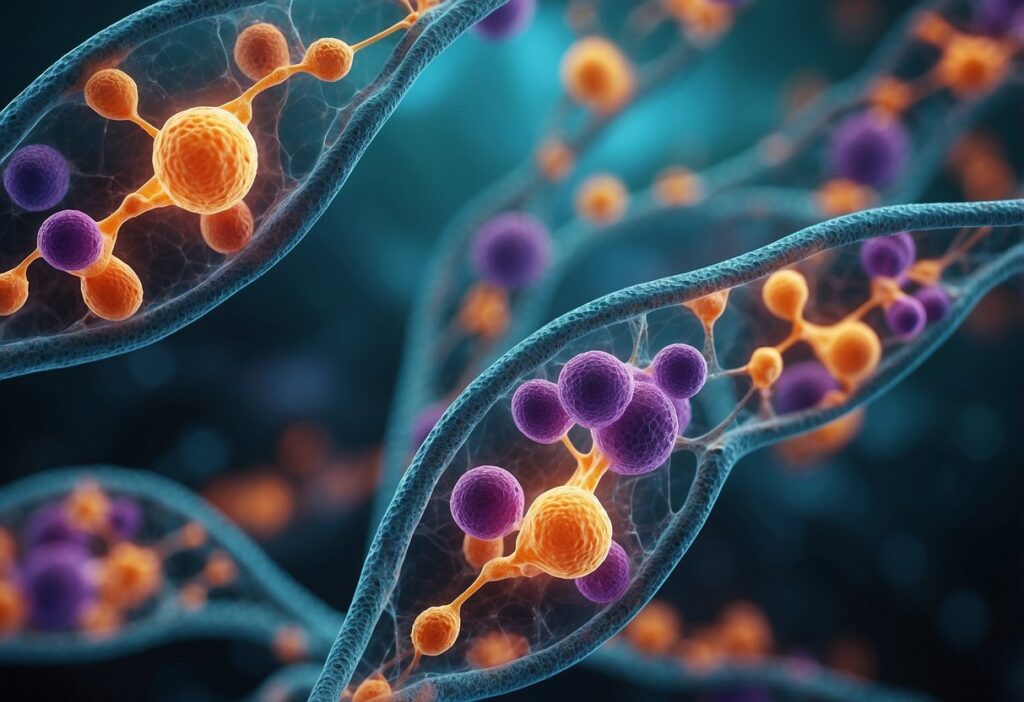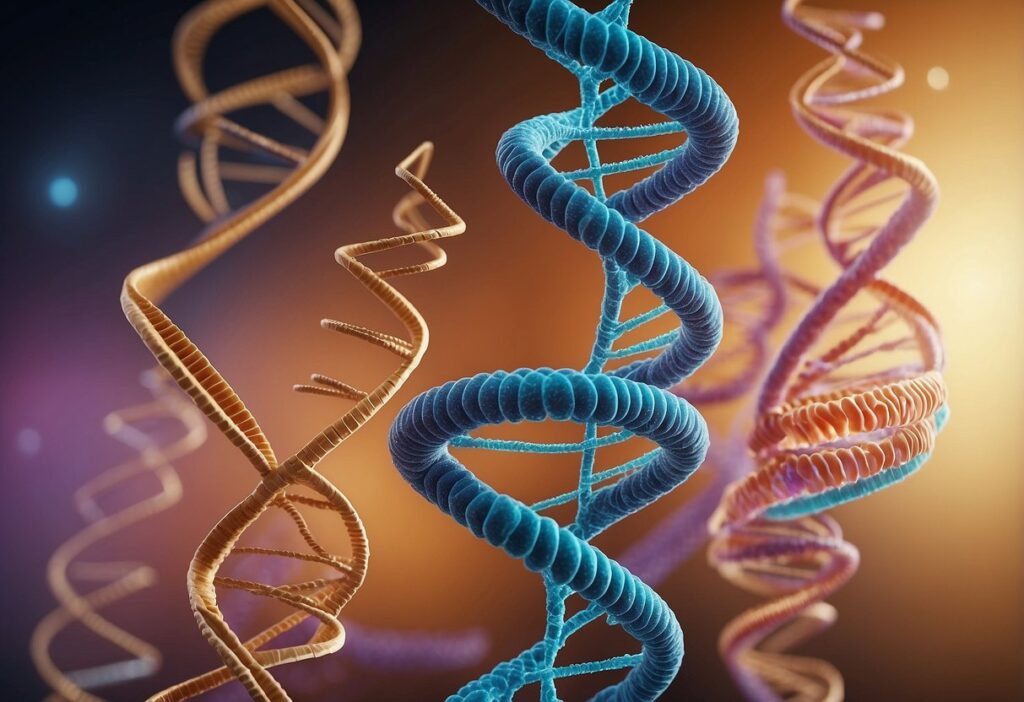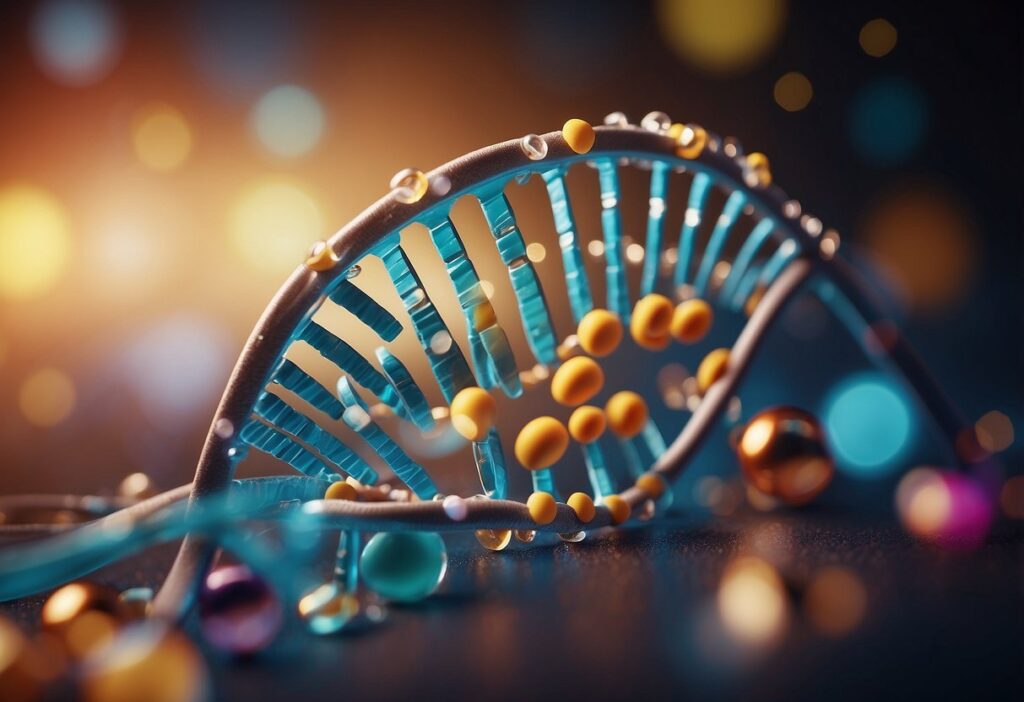Anúncios
Epigenetics explores how gene expression is influenced by external factors without altering the DNA sequence itself. Lifestyle choices, such as diet, physical activity, and stress management, can lead to epigenetic modifications that significantly affect one’s health. For example, maternal lifestyle factors, including diet and exercise, can impact epigenetic changes in offspring, highlighting the importance of healthy habits across generations.

Lifestyle factors might affect human health via epigenetic changes, potentially influencing the onset of various diseases and overall well-being. Stress, unhealthy eating, and sedentary behaviors can lead to detrimental epigenetic alterations that disrupt tissue homeostasis. Conversely, positive lifestyle changes can promote better health by maintaining or restoring proper gene expression.
Emerging research underscores the intricate relationship between lifestyle and epigenetic mechanisms, especially concerning conditions like obesity and cancer. A systematic review has examined the association between maternal lifestyle and health outcomes in offspring. Understanding this dynamic can empower individuals to make informed choices for preventing chronic diseases and enhancing lifespan quality.
Fundamentals of Epigenetics

Epigenetics involves changes in gene expression that do not alter the DNA sequence. Key processes include DNA methylation, histone modifications, and the role of non-coding RNAs like miRNA.
Understanding DNA Methylation
DNA methylation involves adding a methyl group to the DNA molecule, often at cytosine bases. This addition usually occurs at CpG sites, regions where cytosine and guanine nucleotides occur next to each other in the DNA sequence. Methylation typically represses gene transcription, leading to decreased gene expression.
DNA methylation patterns are established early in development and can be influenced by environmental factors like diet and stress. These patterns are crucial for normal development and cellular differentiation. Abnormal methylation can lead to various diseases, including cancer.
Histone Modifications and Chromatin Structure
Histone modifications involve the addition or removal of chemical groups to histone proteins around which DNA is wrapped. These modifications can influence chromatin structure and thus affect DNA accessibility for transcription. Common modifications include acetylation, methylation, and phosphorylation.
Histone acetylation typically results in a more open chromatin structure, promoting transcription. Conversely, histone methylation can both activate or repress gene expression, depending on the specific sites modified. These modifications help regulate diverse cellular processes by altering gene activity without changing the DNA sequence.
The Role of miRNA and Non-Coding RNA
MicroRNAs (miRNAs) are short, non-coding RNAs that regulate gene expression post-transcriptionally. miRNAs bind to complementary sequences on messenger RNA (mRNA) molecules, leading to mRNA degradation or inhibition of translation. This process controls the levels of proteins produced in the cell.
Non-coding RNAs, including long non-coding RNAs (lncRNAs), also play regulatory roles in the epigenome. These RNAs can recruit chromatin-modifying complexes to specific genomic loci, thereby influencing histone modifications and DNA methylation. The regulatory functions of non-coding RNAs are essential for the fine-tuning of gene expression in various biological processes.
Lifestyle Factors Influencing Epigenetics

Lifestyle factors play a critical role in influencing epigenetic mechanisms, which in turn can affect health and disease risk. Factors such as nutrition, physical activity, stress, and exposure to environmental chemicals significantly contribute to epigenetic modifications in the human genome.
Impact of Nutrition on Gene Regulation
Nutrition profoundly affects gene regulation through epigenetic mechanisms like DNA methylation and histone modification. Dietary components, including vitamins, minerals, and phytochemicals, can modulate the expression of genes involved in various metabolic processes. For instance, folate and vitamin B12 are essential in maintaining DNA methylation patterns. Specific diets, such as a high-fat diet, can lead to adverse epigenetic changes that promote obesity and metabolic disorders. Additionally, antioxidants found in fruits and vegetables help protect the genome from oxidative damage, enhancing genetic stability.
Effect of Physical Activity on Epigenetic Marks
Regular physical activity is linked to beneficial adjustments in epigenetic marks that can improve overall health. Exercise has been shown to alter DNA methylation patterns in genes associated with inflammation and energy metabolism. These changes can reduce the risk of chronic diseases such as type 2 diabetes and cardiovascular diseases. Studies demonstrate that both aerobic and anaerobic exercises can induce epigenetic modifications. This emphasizes the importance of incorporating various forms of exercise into daily routines to support optimal gene expression.
Stress, Inflammation, and Epigenetic Changes
Chronic stress and inflammation can lead to detrimental epigenetic alterations. Stress-induced hormonal changes, particularly involving cortisol, can affect gene expression through modified methylation patterns. These epigenetic changes are associated with a heightened risk of mental health disorders like depression and anxiety. Inflammation, often a response to stress, further impacts the epigenome, potentially leading to autoimmune diseases. Reducing stress through mindfulness, therapy, and lifestyle modifications is essential to counter these adverse epigenetic effects.
Toxins and Environmental Chemicals as Epigenetic Modifiers
Exposure to toxins and environmental chemicals, such as particulate air pollution, can cause significant changes in the epigenome. Chemicals found in polluted air, water, and food can disrupt normal epigenetic processes, leading to increased disease susceptibility. For example, bisphenol A (BPA) and heavy metals like lead are known to interfere with DNA methylation and histone modification. Limiting exposure to these harmful substances by avoiding polluted areas and using clean products can help mitigate their negative impact on gene expression. Efforts to reduce environmental pollution are crucial in protecting public health through the maintenance of healthy epigenetic patterns.
Epigenetics in Health and Disease

Epigenetics plays a crucial role in various health conditions, including cancer, obesity, diabetes, and aging. Understanding these mechanisms offers potential pathways for prevention and treatment.
Role of Epigenetics in Cancer Development and Prevention
Epigenetic modifications such as DNA methylation and histone acetylation influence cancer progression. Abnormal epigenetic changes can activate oncogenes or silence tumor suppressor genes. Certain lifestyle factors and environmental exposures can contribute to these changes.
Cancer chemoprevention strategies often target these epigenetic signatures. For example, drugs that reverse DNA methylation or modify histone acetylation can potentially prevent cancer development. Emerging research focuses on identifying specific epigenetic biomarkers for early detection and precision treatments.
Obesity, Diabetes, and Epigenetic Regulation
Obesity and diabetes have strong links to epigenetic regulation. Nutritional factors and physical activity can alter gene expression through epigenetic mechanisms. Epigenetic changes in adipose tissue contribute to metabolic dysfunction and insulin resistance.
Gene regulation through DNA methylation and histone modifications affects the development of these metabolic conditions. Research is ongoing to develop interventions that can modify these epigenetic markers, offering new avenues for the prevention and management of obesity and diabetes.
Epigenetic Perspectives on Aging and Regeneration
Aging involves complex epigenetic changes that influence gene expression. Age-related epigenetic drift, like DNA demethylation, affects cellular function and regeneration capacity. These changes can contribute to age-related diseases and decline in tissue function.
Understanding epigenetic mechanisms behind aging opens doors for regenerative medicine. By manipulating these pathways, scientists aim to improve tissue regeneration and counteract age-related decline. Epigenetic therapies could potentially extend healthy lifespan and enhance quality of life in the elderly.
Nutrition and Epigenetic Mechanisms

Nutrition plays a critical role in influencing epigenetic mechanisms. Specific nutrients can affect gene expression by altering epigenetic markers, with a balanced diet being pivotal for maintaining optimal health through epigenetic pathways.
The Importance of a Balanced Diet
A balanced diet provides the essential nutrients required for normal bodily functions and epigenetic regulation. Key nutrients affect gene transcription processes and overall health. Insufficient intake of vital nutrients may disrupt normal epigenetic mechanisms, leading to adverse health outcomes.
A balanced diet includes diverse food groups containing proteins, fats, carbohydrates, vitamins, and minerals. Nutrients from these groups support DNA methyltransferases, enzymes crucial for DNA methylation, promoting healthy gene expression patterns.
Dietary Methyl Nutrients and DNA Methylation
Dietary methyl nutrients, such as folate, vitamin B12, and methionine, are crucial for DNA methylation. This process involves adding a methyl group to DNA, typically at cytosine-phosphate-guanine (CpG) sites, which can regulate gene expression.
These nutrients act as methyl donors in one-carbon metabolism, a biochemical pathway essential for generating methyl groups. Adequate intake of these nutrients supports the activity of DNA methyltransferases, ensuring proper methylation patterns that are necessary for normal cellular function and disease prevention.
Impact of Phyto-Oestrogens on Epigenetic Memory
Phyto-oestrogens are plant-derived compounds that can mimic the action of estrogen in the body. They are found in foods like soy and flaxseeds and have been shown to influence epigenetic memory.
Phyto-oestrogens can affect the activity of enzymes involved in DNA methylation and histone modification. Their impact on epigenetic mechanisms can lead to changes in gene expression, potentially offering protective effects against certain cancers and other diseases.
Regular consumption of phyto-oestrogen-rich foods may modify epigenetic marks, contributing to the long-term regulation of gene expression. This highlights the importance of including such compounds in a balanced diet for their potential health benefits.
Epigenetic Consequences of Early Life Experiences

Early life experiences have profound effects on epigenetic modifications that can shape an individual’s health trajectory. These experiences begin in the womb and extend through childhood, influencing various systems including endocrine functions, development, and potential disease susceptibility.
Effects of Maternal Lifestyle on Fetal Development
Maternal behaviors such as cigarette smoking and nutrition during pregnancy have significant epigenetic impacts on the fetus. Cigarette smoking has been linked to alterations in DNA methylation patterns, which can affect fetal development and increase the risk of respiratory issues and other health problems.
Nutrient intake during pregnancy is crucial. For instance, folate deficiency can disrupt normal DNA methylation processes, leading to developmental disorders. Conversely, appropriate levels of vitamins and minerals support healthy epigenetic programming. Exposure to endocrine disruptors is another concern, as these chemicals can interfere with hormone systems and affect fetal growth.
Epigenetic Implications of Childhood Environment
The environment in which a child grows up can have lasting epigenetic effects. Early childhood is a critical period where exposure to stress, nutrition, and social behaviors can influence gene expression. For example, children exposed to high levels of stress may experience changes in cortisol levels, affecting neurodevelopment and potentially leading to mental health issues later in life.
Nutrition remains important during childhood, as a balanced diet supports proper epigenetic regulation. Studies on twins show that even with identical genetics, differing environments can lead to distinct epigenetic markers, emphasizing the importance of early environmental factors in shaping health outcomes.
Transgenerational Epigenetic Inheritance
Epigenetic changes are not confined to a single individual and can be passed down to future generations. This concept, known as epigenetic transgenerational inheritance, suggests that environmental factors affecting parents, such as exposure to toxins or malnutrition, can influence the health and fertility of their descendants.
In males, for instance, paternal lifestyle factors, including diet and exposure to harmful substances, can affect sperm quality and result in epigenetic changes that influence offspring health. During lactation, maternal diet can also impact the infant’s epigenetic landscape, underlining the importance of maintaining a healthy lifestyle even after pregnancy.
These findings highlight the need for a holistic approach to prenatal and early childhood care to ensure lasting health benefits across generations.